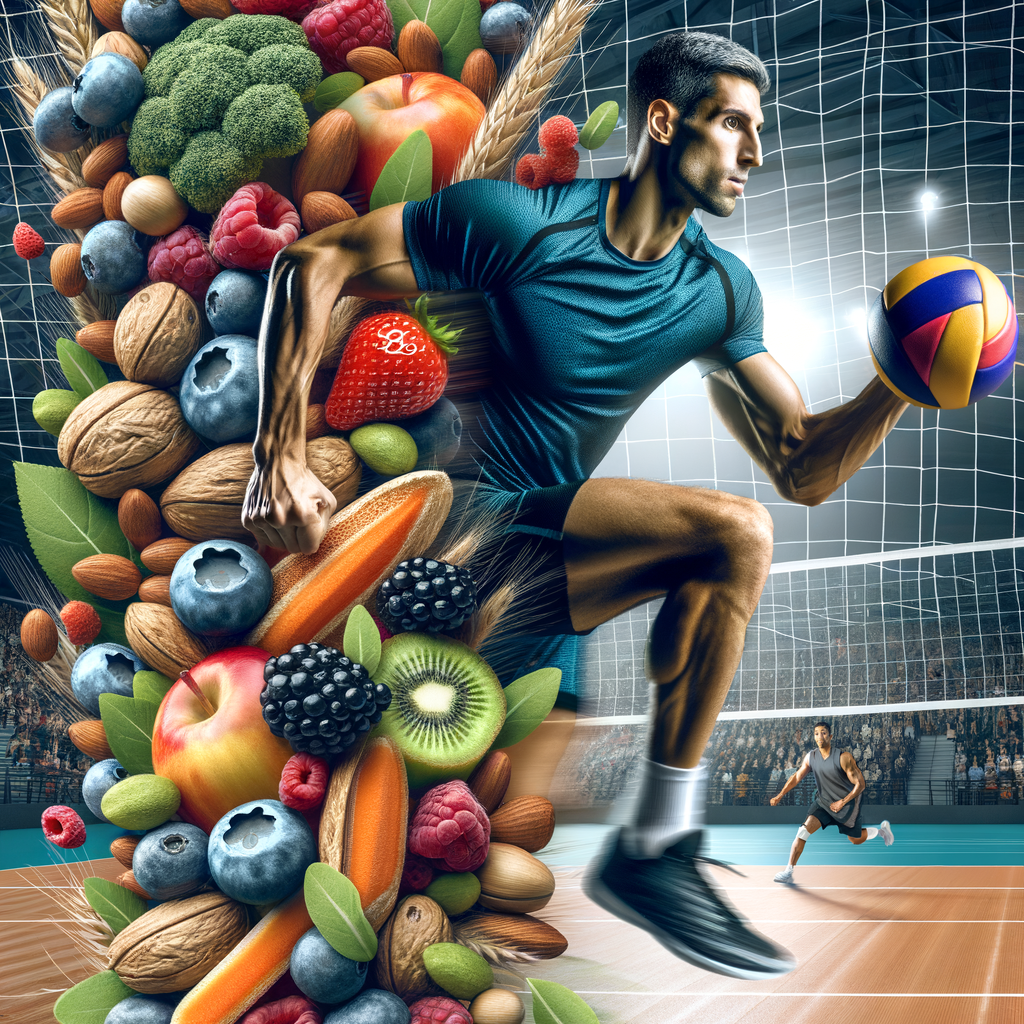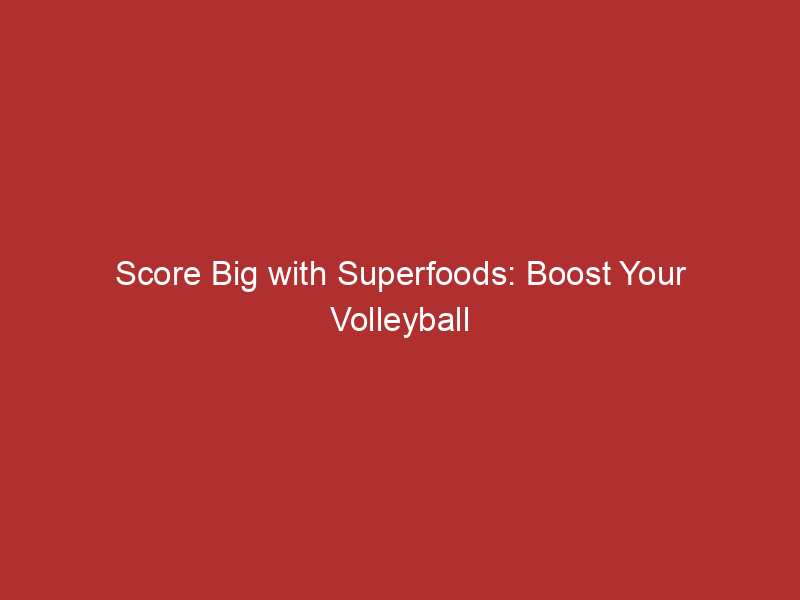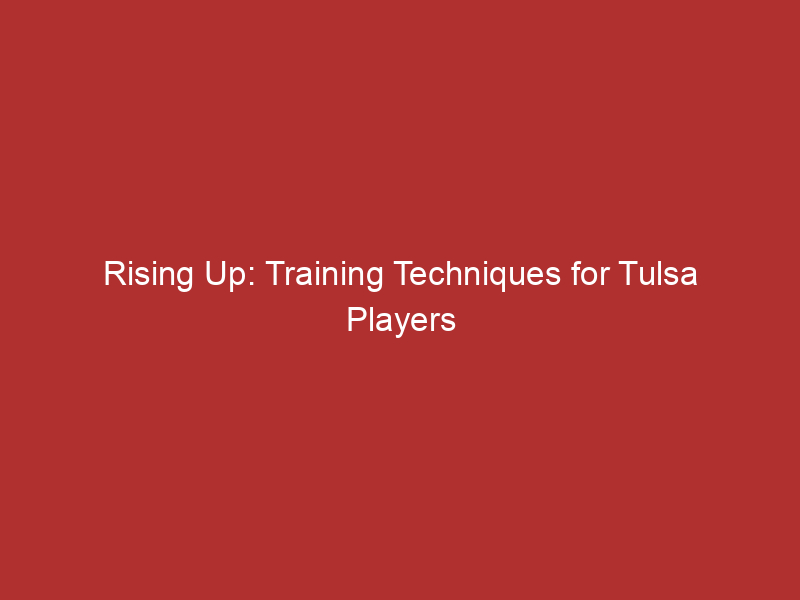
Introduction: Volleyball Nutrition and Superfoods
Welcome to our comprehensive guide on volleyball nutrition and superfoods. In this post, we will explore the importance of nutrition in volleyball, understand what superfoods are, and delve into the benefits of superfoods for athletes. Let’s get started!
- Importance of nutrition in volleyball
- What are superfoods?
- Benefits of superfoods for athletes
Volleyball is a high-intensity sport that requires strength, speed, and endurance. Proper nutrition is crucial for a volleyball player’s performance and recovery. Eating the right foods provides the energy needed to play and helps repair and build muscles after a game or practice. A well-balanced diet can also boost the immune system, reducing the risk of illness and injury.
Superfoods are nutrient-rich foods considered to be especially beneficial for health and well-being. They are packed with vitamins, minerals, and antioxidants. Examples of superfoods include berries, nuts, seeds, green leafy vegetables, and fatty fish like salmon. These foods are not only delicious but also provide a wealth of health benefits.
Athletes, including volleyball players, can greatly benefit from incorporating superfoods into their diet. Superfoods can help enhance performance, speed up recovery, and prevent injuries. They provide essential nutrients that fuel the body, support muscle growth and repair, and boost the immune system. For instance, berries are rich in antioxidants that help reduce muscle damage and inflammation. Nuts and seeds provide healthy fats and protein for energy and muscle recovery. Green leafy vegetables are packed with iron and calcium, essential for bone health and muscle function.
In the following sections, we will delve deeper into sports nutrition, explore nutrient-dense ingredients in superfoods, and present a case study on superfoods for sports performance. Stay tuned!
Understanding Sports Nutrition
Sports nutrition is a crucial aspect of an athlete’s performance and overall health. It involves the study and practice of nutrition and diet concerning an athlete’s performance. Let’s dive into the basics of sports nutrition.
Basics of Sports Nutrition
There are three primary components to consider when discussing sports nutrition: macronutrients, micronutrients, and hydration.
- Macronutrients: Proteins, Carbohydrates, and Fats
- Micronutrients: Vitamins and Minerals
- Hydration: Water and Electrolytes
Macronutrients are the nutrients our bodies need in large amounts. They provide the energy (calories) our bodies need to function and perform physical activities. Proteins help in muscle repair and growth, carbohydrates provide energy, and fats are essential for brain function and hormone production.
Micronutrients, on the other hand, are required in smaller amounts but are still crucial for optimal health and performance. They include vitamins and minerals. Vitamins are essential for energy production and immune function, while minerals are important for bone health, muscle contractions, and maintaining a healthy heartbeat.
Hydration is another key component of sports nutrition. Athletes need to stay well-hydrated by drinking enough water before, during, and after exercise. Electrolytes, such as sodium and potassium, are also important as they help maintain the body’s fluid balance, nerve function, and muscle contractions.
In conclusion, understanding sports nutrition is crucial for any athlete. By ensuring a balanced intake of macronutrients, micronutrients, and staying well-hydrated, athletes can enhance their performance and maintain their overall health.
Importance of Sports Nutrition for Volleyball Players
Sports nutrition plays a crucial role in the performance of volleyball players. It helps them meet their energy requirements, aids in recovery, and ensures they stay hydrated. Let’s delve deeper into these aspects.
- Energy requirements for volleyball
- Recovery nutrition
- Importance of hydration
Volleyball is a high-intensity sport that requires a lot of energy. Players need to jump, sprint, and make quick movements, all of which demand a high level of energy. This energy comes from the food they eat. A balanced diet rich in carbohydrates, proteins, and healthy fats can provide the necessary energy for volleyball players. For instance, carbohydrates are the primary source of energy for muscles during high-intensity activities like volleyball.
After a rigorous game or practice session, volleyball players need to replenish their energy stores and repair any muscle damage. This is where recovery nutrition comes in. Consuming a mix of proteins and carbohydrates within 30 minutes after exercise can help speed up recovery. Proteins help repair and build muscles, while carbohydrates replenish the body’s energy stores.
Staying hydrated is crucial for all athletes, including volleyball players. Dehydration can lead to fatigue, decreased coordination, and even heat stroke. Volleyball players should drink water before, during, and after their games or practice sessions to stay hydrated. Additionally, during long and intense workouts, they may need to consume sports drinks that contain electrolytes to replace the ones lost through sweat.
In conclusion, sports nutrition is a key component of a volleyball player’s performance and recovery. By understanding and implementing proper nutrition and hydration strategies, volleyball players can enhance their performance and reduce the risk of injury.
Superfoods for Athletes: Nutrient-Dense Ingredients
As an athlete, your diet plays a crucial role in your performance. Consuming nutrient-dense superfoods can help you maintain your energy levels, recover faster, and improve your overall health. Here are some top superfoods that are particularly beneficial for volleyball players.
Top Superfoods for Volleyball Players
Volleyball is a high-intensity sport that requires strength, speed, and endurance. To perform at your best, you need to fuel your body with the right foods. Here are five superfoods that can help you achieve your athletic goals:
- Blueberries: These small fruits are packed with antioxidants, which can help protect your body from damage. They’re also a great source of fiber and vitamin C, which can help boost your immune system.
- Quinoa: This grain is a complete protein, meaning it contains all nine essential amino acids your body needs for growth and repair. It’s also high in fiber, magnesium, and iron.
- Chia Seeds: These tiny seeds are a powerhouse of nutrients. They’re high in fiber, protein, and omega-3 fatty acids, which can help reduce inflammation and improve heart health.
- Spinach: This leafy green is high in iron, calcium, and vitamin K, which are essential for bone health. It’s also a good source of vitamin C and folic acid.
- Almonds: These nuts are rich in healthy fats, protein, and fiber. They’re also a good source of vitamin E, magnesium, and potassium, which are essential for muscle function and recovery.
Remember, a balanced diet is key to optimal performance. Incorporating these superfoods into your meals can provide you with the nutrients you need to excel in your sport. Stay tuned for our next section where we’ll discuss how to incorporate these superfoods into your volleyball diet.
Incorporating Superfoods into Your Volleyball Diet
Now that we’ve identified some top superfoods for volleyball players, let’s delve into how you can incorporate these nutrient-dense ingredients into your diet. Here are some strategies to help you get started:
- Meal Planning with Superfoods
- Superfood Recipes for Athletes
- Pre-game and Post-game Meals
Meal planning is a great way to ensure you’re getting the right nutrients in your diet. Start by creating a weekly menu that includes meals and snacks. Incorporate superfoods like blueberries, quinoa, chia seeds, spinach, and almonds into your meals. For example, you could have a spinach and quinoa salad for lunch, snack on almonds, and have a blueberry smoothie for breakfast. Remember, the goal is to provide your body with the nutrients it needs to perform at its best.
There are countless recipes available that incorporate superfoods. For breakfast, you could try a chia seed pudding or a quinoa porridge. For lunch, a spinach salad with almonds and blueberries can be a great option. For dinner, a quinoa and vegetable stir-fry can be both delicious and nutritious. Remember, the key is to experiment and find what works best for you.
What you eat before and after a game can greatly impact your performance and recovery. Before a game, aim for a meal that’s high in carbohydrates and protein to provide energy. A quinoa salad with chicken can be a great option. After the game, focus on replenishing your body. A smoothie with blueberries, spinach, and a scoop of protein powder can help speed up recovery.
Remember, incorporating superfoods into your diet is just one part of a comprehensive nutrition plan for volleyball players. It’s also important to stay hydrated, get enough sleep, and maintain a balanced diet. With these strategies, you’ll be well on your way to achieving peak performance on the court.
Case Study: Superfoods for Sports Performance
Let’s delve into real-life examples to understand the impact of superfoods on sports performance. We’ll look at two case studies: the diet of a professional volleyball player and the direct impact of superfoods on performance.
- Case study 1: Professional volleyball player’s diet
Meet John, a professional volleyball player. His diet is a crucial part of his training routine. John’s daily food intake is a balanced mix of proteins, carbohydrates, and fats. But what sets his diet apart are the superfoods he incorporates.
John starts his day with a smoothie made of spinach, bananas, and blueberries. Spinach is a superfood rich in iron and calcium, essential for muscle function and bone health. Blueberries, packed with antioxidants, help in muscle recovery and reduce inflammation.
For lunch, John prefers a salad with quinoa and grilled chicken. Quinoa, a superfood, is a complete protein and a fantastic source of complex carbohydrates. It provides him with the energy he needs for his rigorous training sessions.
John’s dinner usually consists of grilled salmon with a side of sweet potatoes. Salmon, rich in Omega-3 fatty acids, aids in muscle recovery and boosts heart health. Sweet potatoes, a superfood, are high in vitamins A and C, promoting eye health and boosting the immune system.
- Case study 2: Impact of superfoods on performance
Let’s look at a study conducted by the University of California, which focused on the impact of superfoods on athletes’ performance. The study involved two groups of athletes. One group was given a diet rich in superfoods, while the other followed their regular diet.
After six weeks, the group consuming superfoods showed a significant improvement in their performance. They had increased energy levels, faster recovery times, and improved endurance. This study clearly illustrates the positive impact superfoods can have on an athlete’s performance.
In conclusion, incorporating superfoods into an athlete’s diet can significantly enhance their performance. They provide the necessary nutrients and energy, promote faster recovery, and boost overall health. As seen in our case studies, superfoods are indeed a game-changer in sports nutrition.
Conclusion: Nutrient-Rich Foods for Athletes
In conclusion, the importance of nutrient-rich foods for athletes, particularly volleyball players, cannot be overstated. The right balance of proteins, carbohydrates, and fats, along with essential vitamins and minerals, can significantly enhance an athlete’s performance and recovery. Let’s summarize our key takeaways and look at the future trends in sports nutrition.
- Key takeaways: Healthy eating for volleyball
Healthy eating is crucial for volleyball players. A balanced diet rich in lean proteins, complex carbohydrates, and healthy fats provides the energy required for the intense physical activity. Superfoods like quinoa, kale, and blueberries, packed with essential nutrients, can boost performance and speed up recovery.
Hydration is equally important. Drinking plenty of water, especially during and after the game, helps maintain optimal body function. Finally, remember that each athlete is unique. What works for one may not work for another. Therefore, it’s essential to listen to your body and adjust your diet accordingly.
- Future trends in sports nutrition
As we look towards the future, personalized nutrition is emerging as a significant trend in sports nutrition. This approach tailors diet plans to an individual’s specific needs, considering factors like age, gender, health status, and specific performance goals. It’s expected to revolutionize the way athletes fuel their bodies.
Another trend is the increasing focus on plant-based diets. More athletes are turning to plant-based foods for their protein needs, driven by health, environmental, and ethical reasons. This shift is likely to continue, with more plant-based superfoods making their way into athletes’ plates.
Lastly, the role of technology in sports nutrition is growing. From apps that track nutrient intake to wearable devices that monitor hydration levels, technology is helping athletes make more informed decisions about their diet and nutrition.
In conclusion, the field of sports nutrition is evolving rapidly. By staying informed and adaptable, athletes can make the most of these changes to enhance their performance and overall health.






